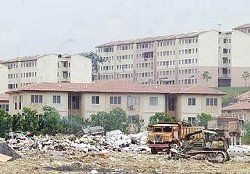Conflicting interests at landfill
The Star 28/12/2004
ONCE tucked away within a secluded forest, the Ayer Hitam
Landfill in Puchong, Selangor, today finds itself sitting smack in
the middle of a burgeoning residential area as housing development
had been approved with little thought given to the potential health
and environmental risks.
Where a decade ago garbage trucks
plied a dirt road that traversed forested land to reach the
landfill, today they have to navigate through a maze of link houses,
bungalows and apartment blocks.
The valley within which the landfill
sits on, once surrounded by greenery, is now completely hemmed in by
buildings. Taman Equine, Taman Putra Permai, Taman Lestari, Taman
Pinggiran Putra and Pusat Bandar Putra Permai are among the
residential enclaves closest to the landfill.
 |
|
Apartments and link houses
have crept up to the Ayer Hitam Landfill in Puchong as
tracts of forest meant to act as a buffer zone were
cleared for development.
|
“The residents here don’t need a
garbage truck to collect their rubbish. They can just pass us their
bin bags over the fence and say tolong buang (please throw),”
jokes Zamri Abdul Rahman, general manager of Worldwide Landfills Sdn
Bhd, which operates the waste disposal facility.
The sight is incongruous, to say the
least. The landfill literally sits in the backyards of houses and
apartments. In some spots, a mere 300m is all that separates them.
The waste mound itself is even higher than some of the low-rise
apartment blocks.
No wonder there has been outcry over
the foul stench, health hazards and pollution risks from the
landfill, which is the destination of 3,000 tonnes of waste
discarded daily by Klang Valley folk. And politicians have succumbed
to public demands. Mentri Besar Datuk Seri Dr Mohd Khir Toyo has
ordered that the landfill cease operations by year-end.
Standing in the middle of the rubbish
disposal site, one can empathise with the residents. The stench
coming from the leachate treatment ponds reeks and the ammonia gas
stings. Sure, no one wants a smelly rubbish tip in his backyard but
the truth of the matter is, the landfill was there first.
It was carved out of the sprawling
Ayer Hitam Forest Reserve in 1995 and tracts of greenery were
specifically left intact around the site as a buffer. Over the
years, however, the forested land was parcelled out to developers,
resulting in today’s incredulous sight of houses a mere stone’s
throw from the landfill.
Even portions of the 58ha that the
state government had allocated for the landfill were given away to
developers, leaving Worldwide Landfills with only 42ha today.
“The development started around 2000.
We raised our concerns to state authorities but it all happened so
fast. Suddenly, the houses were all around us,” says Zamri.
House buyers might not have known
about the landfill in their backyard but surely the developers did?
As do the government agencies which approved the residential
projects. Last year, Selangor Department of Environment director
Kalsom Abdul Ghani said many developers had flouted guidelines by
building right up to the edge of their property and not planting
trees to act as buffers.
This is yet another case of failed
landuse planning – or the lack of.
At the landfill, workers spray a
mixture of enzymes onto the trash to minimise odours but the stench
would not go away – this is a rubbish dump, after all.
The closure order may appease
residents but appears to have been ill-advised. If the landfill
closes, where is all the trash going to go? There is no alternative
disposal site, particularly one that is equipped with anti-pollution
features. A new landfill in Bukit Tagar near Kuala Selangor and an
incinerator in Broga are still under construction, while other
existing landfills in Selangor are open dumps.
Ayer Hitam was built to take in up to
seven million tonnes of waste generated within Selangor and to last
for 20 years but a sudden daily deluge of 1,500 tonnes from City
Hall since April 2002 had drastically shortened its lifespan. Zamri
discloses, however, that there is still some land left for
expansion, which will stretch the landfill’s usefulness by a couple
of years.
But with development closing in, he
admits the site is no longer suitable for a landfill. “We want to
operate the landfill properly, and not with all these public
complaints.”
What a shame – a perfectly good
landfill has to close before its time. |